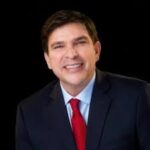Check out the website: https://lenspoliticalnotes.com Look at the recent Political Notes and Len’s Letters on the website:
May 7th, 2025 Len’s Letter #78 Should you compare Trump to Hitler?
2025

Former Republican Vice President Mike Pence awarded John F. Kennedy Provide in Courage Award for persisting in the 2020 Electoral College count despite insurrectionist threats and Trump’s false claims that the election was stolen.
Some argue that even if there is an apt comparison between Adolph Hitler and Donald Trump, it should not be made. Much of the public would take such a comparison as an overwrought left-wing complaint. Trump’s defenders gain strength defending him from any claim that he is like Hitler.
Nevertheless, we should see if there is legitimacy to the comparison. Take a look with me at the comparison.
Three areas of action by Hitler and Trump invite us to compare them: The consolidation of power and exercise of that consolidated power, the identification of an internal scapegoat, and expansive international ambitions. The nature of Hitler’s actions in these three areas make him a standard for evil government. Does Donald Trump meet that standard?
I. Adolph Hitler was born in 1889. In 1919 or 1920, he joined the German Workers Party and was instrumental in changing its name to National Socialist Party (Nazi as we know it). He became the party leader in 1921 and led an effort, in 1923, to overthrow the Bavarian government.
For that act, he was sentenced to five years in jail. Hitler spent his jail time productively. He wrote an autobiography as well as Mein Kampf (My Struggle, a statement of his purpose in life and in politics). Released from prison early, in 1924, he reestablished his party. By 1930, he led the Nazis to a successful election, increasing Nazi membership in the Reichstag (parliament) from 14 to 107. He had campaigned focusing on anti-Communism and his claim that the Communist movement was a Jewish conspiracy.
Nazis had become the second largest party in the Reichstag. Not enough, however, to achieve Hitler’s goal of obtaining high office. That goal was achieved in 1933. In alliance with conventional conservatives, the President, Paul Von Hindenburg, was persuaded to appoint Hitler as Chancellor (Prime Minister) of Germany.
II Donald Trump was born in 1946 (The year of Adolph Hitler’s death by suicide). Kings and other heads of family dynasties plan for a successful transition after they die by having an heir and (in case something happens to the heir) a spare. Donald Trump was his father’s spare.
In 1971, Donald Trump succeeded his father as head of the family real estate business, which he renamed The Trump Organization. After building skyscrapers and acquiring more of them as well as hotels, casinos, golf courses and other businesses, he endured six bankruptcies, and turned to television. Beginning in 2004, ending in 2015, he hosted the reality show The Apprentice.
In 2016, he ran for President of the United States and gained the Republican nomination. He won election, losing the popular vote, but gaining a majority in the Electoral College. Trump focused on the dangers of illegal immigrants to the United States. His first presidency was marked by bans on travel from a few Muslim majority countries, passage of a huge tax reduction bill for the wealthy, and a country and government overwhelmed by the Covid pandemic which eventually killed more than a million people.
Trump lost the 2020 election, contested the result through numerous lawsuits, and encouraged a mob-like insurrection to prevent the counting of the Electoral College ballots. Through the alliance between conventional conservative Republicans and those who formed his MAGA movement, Trump avoided an impeachment conviction after the insurrection and was elected again in 2024.
- In 1933, Hitler, now the Chancellor (Prime Minister) of Germany, cracked down on Communists after the Reichstag fire, nearly achieved a majority in a 1933 terror-filled election with a Nazi campaign secretly funded by German industrialists, and obtained a vote to grant his government legislative authority for four years after the opposition Catholic Center Party capitulated to obtain a promise that their party would remain in existence.
- With that authority, Hitler ruled by edict. He proclaimed the Nazi Party the only legitimate party in the country. He abolished all other political parties (though he had to wait a month to make it clear that the Communist Party was among the parties abolished and two months for the same clarity about the Socialists). He eliminated the autonomous powers of the several states within Germany and replaced state governors with Nazis. And he disbanded trade unions, though he had to act on that again in May when he also outlawed strikes. Finally, also in March, ominously, he opened the Dachau concentration camp. Dachau, named for the village in Bavaria in the south of Germany where the camp was located, was intended to hold communists, socialists, and other active political opponents.
- The governmental focus on Jews began in April. Boycotting Jewish shops and businesses was encouraged. Through actions of the Civil Service, Jews were barred from university and state employment. By May, books by Jews or subversives were banned from public access. By July, Jews whose origins were in Eastern Europe, but were German citizens, were stripped of German citizenship. Also in July, Nazis began public book burnings. Books still available in book stores or were otherwise accessible that were written by Jews, communists, socialists or people otherwise dangerous to Nazi ideology were burned in public in a frenzy of hatred. Hitler was well on his way in making Jews, Romani, communists, socialists, and homosexuals people to be legitimately scorned and mistreated throughout the country.
Hitler demonstrated his international ambitions later in 1933. He withdrew Germany from the League of Nations and, in violation of the Treaty of Versailles, began expanding the German army.
Within the first ten months of his serving as Chancellor, Adolph Hitler had consolidated considerable authority, had taken visible and dramatic action against his identified scapegoats, and had taken modest steps toward diplomatic and military adventurism. There was more consolidation of power to come. Initially, he was focused on expelling Jews not killing them, and his military and diplomatic offensive was focused on uniting Germans into a single state.
- Trump began his tenure in 2024 still claiming he had won the 2020 election and pardoning all those convicted in the mob action that attempted to stop the counting of the electoral college votes. Unlike Adolph Hitler’s Germany, Trump had to impose his influence on the United States legislature rather than have then vote away their own authority. Trump had no simple way to gain control of the states.
- Trump’s goal, however has been to take control and destroy any power centers that could or actually did stand in his way. After the November 2024 election, even before he took office, Trump was announcing Cabinet nominees. With the Pete Hegseth nomination to Defense, through intimidation, he forced the principal Senatorial confirmation opponent to back down and with that gained a kind of control of the Senate. Trump used the narrow Republican margin in the House to gain influence, to get them to pass “one big beautiful” budget framework. While nurturing his control of the legislature and demonstrating his capacity for vengeance by firing or harassing opponents, he next focused on agencies. In many cases, without the authority to do so, he fired Department Inspector Generals, agency overseers and agency heads.
Through an Executive Order, Trump created the Department of Government Efficiency (DOGE), led by trillionaire Elon Musk. DOGE began by all but eliminating the international humanitarian agency USAID, drastically reducing the size of the Department of Education and firing numerous staff at other Departments and Agencies. Some firings targeted individual internal opponents, but mostly the targets were agencies that had roles Musk and Trump opposed. For instance, enough staff were eliminated from the Social Security Administration to make it difficult for it to fulfill its mission. Furthermore, we have no idea what the consequences will be of DOGE obtaining, for Musk, hordes of personal data from the Social Security Administration and the Internal Revenue Service.
Trump tackled power centers outside of government – the press, universities, law firms. Some law firms have rejected the pressure. Harvard University, targeted with Trump’s perverse claim of antisemitism, has resisted governmental control along with many sister institutions.
Some states and the Defense Department have showed how to comply with Trump by eliminating books about or by minorities from schools and libraries. Other states and organizations and some individuals subject to firing have resisted by using the Courts, the branch of government of which Trump has failed to gain control. There are also signs of popular resistance. Trump’s poll numbers are quite low for a recently elected President. Resistance organizations have led peaceful marches in the streets. Republicans have done poorly in scheduled or special elections as they have arisen as a result of deaths or resignations by incumbents.
- Trump’s focus on undocumented immigrants as scapegoats began on the first day of his second term with his attempt to abolish birthright citizenship. He would prevent the undocumented from having children who were automatically United States citizens. He threatened local officials who got in the way of ICE enforcing his plan for mass deportation of the undocumented. He explored where to put the deportees. He considered Guantanamo, has announced he would reopen Alcatraz prison, and, for some, he settled on El Salvador. It was not only the undocumented immigrants Trump was after. Abortions were a target. Homosexuals, as well. One Republican proposed a retreat from the legality of same sex marriage. The most vulnerable target were Transexuals, people who changed their gender identification.
Particular institutional targets were schools, businesses, organizations, states and agencies that practiced and encouraged Diversity, Equity, and Inclusion (DEI). Where he had the authority, he took or threatened to take funds away from those who retained a commitment to DEI – implying that this was discrimination against white people. School curriculums were another target. Anything that might make children (really, white children) feel bad would be abolished. Schools were expected to scour their libraries to remove offensive material. The Defense Department got into the act removing anything that praised women or minorities from Academy libraries and rejecting the celebration of weeks or months devoted to recognizing women or minoirities.
- Trump is a child of the 1960s. You would not find him wearing a tie-dyed T shirt, but someone describing his life from the 1960s to the present could cite the phrase “Make Love Not War.” He spent a lot of time seeking and finding sexual partners. He avoided service in the Vietnam War and, as president, avoided military confrontations. Nevertheless, his foreign policy is aggressive: Make Canada the 51st state. Make Greenland American. Make financial war on the world by raising tariffs based on a nonsensical formula. Trump believes his tariff war prevents the United States from being cheated by other countries.
If we think beyond the first 100 or so days……
Hitler did not face much resistance in 1930 or the next few years. A little more than a year in, the leadership of the Storm Troopers, an “independent” Nazi militia were executed. 1938 was an eventful year. At Austria’s “request,” Germany and Austria were unified. England’s Neville Chamberlain agreed to Germany’s take-over of the heavily German Czechoslovakian Sudetenland. Depredations began in earnest against the Jews with the destruction and murders of Kristallnacht. 1939 foreign adventures were the beginning of the end, though it did not seem like the end at the time. The invasion of Poland led France, Britain, Australia, and New Zealand to declare war against Germany.
Donald Trump has met considerable domestic opposition. The most important institutional opposition has been the Federal Courts. The New York Times reported that, as of May 2, federal courts have ruled against Trump 135 times. These suits have been brought on behalf of law firms and universities, on behalf of states, on behalf of fired Agency heads, and more. Few issues have reached the US Supreme Court. Nor has Trump’s capacity to delay, to pretend to accept or misunderstand decisions been successfully blocked by courts. We have to see whether the Supreme Court believes it OK to ignore its order to return someone deported to an El Salvador prison without due process, whether it is OK to fire Agency overseers for reasons other than seriously improper behavior, whether it is OK to impose tariffs without seeking Congressional approval, whether it is OK to only pretend to comply with a variety court orders.
While the “chaos” at the southern border was an enormously popular campaign issue, deportations have not been so popular. Especially unpopular are deportations of people who have been settled in communities for a long time. As for other scapegoats, I may be wrong, but the likelihood of ending same sex marriage is as great as another extreme right wing hobby horse – the prohibition of contraception.
Donald Trump’s fewest successes have come on the international front. Canadians were so angry at his contemptuous proposal, they voted to retain the government of the anti-Trump Liberal Party. Australia, in a kind of echo, did the same with a differently named center-left party and even more emphatically. Greenlanders have been clear they have no interest in becoming a United States territory; nor is Denmark planning to cooperate and give up its authority over Greenland. Trump’s effort to tack towards assisting Putin’s Russia in its self-initiated war with Ukraine has not led to peace. Putin seems to want a military victory and full control of Ukraine. Even if Trump retreats entirely from supporting Ukraine, it is possible that European support will continue and will make a difference. Trump has negotiated a deal with Ukraine for access and profits from Ukraine’s “rare earths.” That agreement could make Trump a Ukraine supporter, but truly, Trump has been unable to end this conflict he had promised to end on Day One.
Trump’s international tariff war threatens the international economy without gaining the transformation in international trade, in American revenue, or growth in American manufacture that he fantasizes. Nor is the trade war succeeding with China, which has less need than Trump to respond to a discomforted public. It is possible that neither China or the US will benefit from a trade war or whatever trade agreement is created as a result of the war.
It is helpful, not dangerous, to contemplate Trump’s resemblance to Hitler.
- We can see that Trump has one goal similar to Hitler’s – consolidating power in the executive. Hitler succeeded. The Courts, the states, and such American institutions as universities and law firms, have, so far, prevented Trump from succeeding.
- We can see that, like Hitler, Trump has identified a large group as dangerous to national unity (undocumented immigrants for Trump, Jews for Hitler). Furthermore Trump, like Hitler had additional groups to vilify – political liberals and people whose approach to sex was different from the approach of most of us. Hitler eventually turned to killing Jews and others. Do we believe that Trump could successfully turn to mass murder to prevent the undocumented from remaining the US? I don’t. What we can expect is that Trump will continue to ignore constitutional limitations, will be told he cannot ignore those limitations, and will ignore them anyway. Trump’s persistence cannot be underestimated. The individuals and organizations that oppose him will have to risk their resources and their personal safety with as much determination as Trump has to deplete their resources and elimiinate their safety.
- Trump does not believe in the “soft” arts of diplomacy, so he killed off USAID. He opposes military wars, prefers economic ones. He seems to be losing the economic war that he has entered.
To sum up, however much Trump resembles Hitler and other tyrants for that matter, he is not having an easy time gaining control over things domestic, he is unlikely to go to the lengths that Hitler went in dealing with his scapegoats, and he is already flailing in his international aggression.
Meanwhile, we must do what Winston Churchill called for in dealing with Hitler and the Nazis: “Resist, resist, resist.”
Let’s strengthen Trump’s institutional opponents: Gain a majority in the House and Senate in 2026. Gain Governorships throughout the country.
Governor candidates to support now
2025
Virginia elects a governor this November.

Abigail Spanberger is a former Member of Congress and former member of the CIA. The term limited Republican governor cannot run for reelection, but his Lt. Governor, extremist Winsome Earl-Sears is the Republican candidate. While Abigail Spanberger appears to be the favorite in this contest, at this stage she needs our support. DONATE. See Len’s Political Note #705.
2026
This is a beginning.
Arizona

Arizona’s Governor Katie Hobbs. A former social worker and secretary of state. She was elected in 2022 by a 50.3 – 49.7 margin. DONATE. See Len’s Political Note #712
Ohio

Ohio’s Democratic candidate for Governor is former State Medical Director Amy Action. She is one of the heroes in dealing with the pandemic. DONATE. See Len’s Political Note #724
Wisconsin

Tony Evers appears to be running for a third term. He has been helping Wisconsin recover from eight years of draconian government. Now, with a good election year and redistricting, he might have a Democratic legislature to work with. DONATE. See Len’s Political Note #723
The Democrats most vulnerable Senate incumbent
Georgia

Georgia’s US Senator Jon Ossoff. A former Congressional aide and investigative documentary film reporter. He was elected in 2020 (2021 including the runoff) by a 50.6-49.4 margin and is the Democrats most vulnerable incumbent (although Republican Governor Brian Kemp’s announcement that he is not running is helpful). DONATE. See Len’s Political Note #717
Democrats most vulnerable members of the House.
The incumbents whose victories were by the narrowest margins

California 13 Former Assemblyman Adam Gray flipped this seat with a 187 vote win. DONATE. His likely Republican opponent is Javier Lopez, mayor of the small city of Ceres. See Len’s Political Note #716

California 45 Attorney Derek Tran flipped this seat with a 653 votes win. DONATE. We do not yet know who his Republican opponent will be, though some are urging Michelle Steel to run to get her seat back. See Len’s Political Note #717

Maine 02 Incumbent Jared Golden retained his seat with a 2,706 win. DONATE. We do not yet know who his Republican opponent will be. See Len’s Political Note #719

Ohio 09 Incumbent Marcy Kaptur retained her seat with a 2,832 vote win. DONATE. We do not yet know who her Republican opponent will be, though some think her 2024 opponent Derek Merrin will run again. See Len’s Political Note #718

Texas 34 Incumbent Vicente Gonzalez retained his seat with a 5,237 win. DONATE. We do not yet know who his Republican opponent will be. See Len’s Political Note #720

North Carolina 01 Incumbent Don Davis retained his seat with a 6,307 win. DONATE. We do not yet know who his Republican opponent will be. See Len’s Political Note #721
And a continuation of the North Carolina Supreme Court Story

Support Democrat Allison Riggs in her effort to stay on the North Carolina Supreme Court and protect voting rights. She won the election in November by 734 votes. Her opponent, Republican North Carolina Appeals Court Judge Jefferson Griffin challenged 65,000+ voters who met North Carolina requirements when they registered to vote, but new laws called for additional information from them.
The state Supreme Court ruled that approximately 60,000 votes did not have to be withdrawn; that the registration of about 5,000 military votes without photo IDs had to be “cured” for their votes to count (presumably through providing photo IDs), and about 200 votes by North Carolina voters who had never lived in the state would be withdrawn from the voter count (these would include, for instance, children of North Carolina ex-patriots who turned 21 while abroad). This ruling probably ensures Allison Riggs’ victory, but does not end the law suit.
Allison Riggs continued her lawsuit to preserve the voting rights of members of the military and members of the ex-patriot community. Trump appointee Chief U.S. District Judge Richard E. Myers ruled Griffin was attempting to change the rules after the fact, ordered North Carolina not to throw out any votes and to certify results of the election as a victory for Allison Riggs.
It could be that this lawsuit is done and the election finally confirmed as won. In case Griffin continues to appeal, you can DONATE and help Justice Riggs continue with her law suit. You can also wait a little bit. The other Democratic member of the North Carolina Supreme Court will be coming up for election.